Fleurs du Mal Magazine


Or see the index
.jpg)


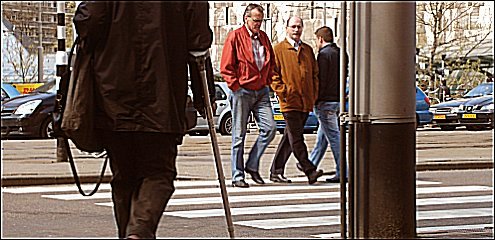



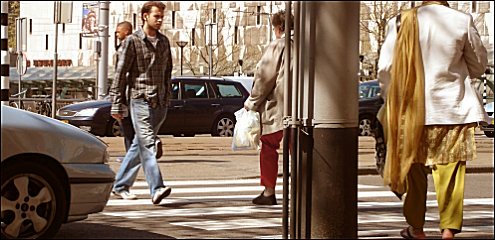
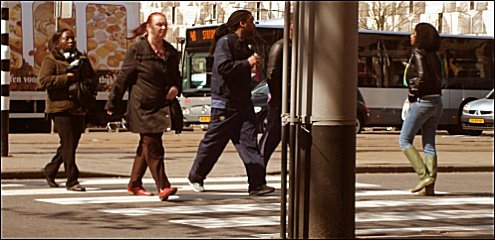




Monica Richter:
Rough Crossing
Rotterdam 2009
kempis poetry magazine – magazine for art & literature
m u s e u m o f l o s t c o n c e p t s
More in: Monica Richter, Richter, Monica
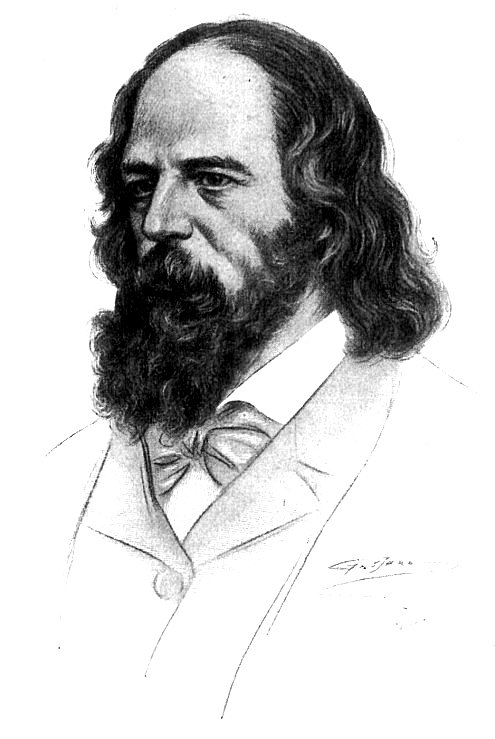
Alfred Lord Tennyson
(1809-1892)
T h e M e r m a i d
1
Who would be
A mermaid fair,
Singing alone,
Combing her hair
Under the sea,
In a golden curl
With a comb of pearl,
On a throne?
2
I would be a mermaid fair;
I would sing to myself the whole of the day;
With a comb of pearl I would comb my hair;
And still as I comb’d I would sing and say,
"Who is it loves me? who loves not me?"
I would comb my hair till my ringlets would fall,
Low adown, low adown,
From under my starry sea-bud crown
Low adown and around,
And I should look like a fountain of gold
Springing alone
With a shrill inner sound,
Over the throne
In the midst of the hall;
Till that great sea-snake under the sea
From his coiled sleeps in the central deeps
Would slowly trail himself sevenfold
Round the hall where I sate, and look in at the gate
With his large calm eyes for the love of me.
And all the mermen under the sea
Would feel their immortality
Die in their hearts for the love of me.
3
But at night I would wander away, away,
I would fling on each side my low-flowing locks,
And lightly vault from the throne and play
With the mermen in and out of the rocks;
We would run to and fro, and hide and seek,
On the broad sea-wolds in the crimson shells,
Whose silvery spikes are nighest the sea.
But if any came near I would call, and shriek,
And adown the steep like a wave I would leap
From the diamond-ledges that jut from the dells;
For I would not be kiss’d by all who would list,
Of the bold merry mermen under the sea;
They would sue me, and woo me, and flatter me,
In the purple twilights under the sea;
But the king of them all would carry me,
Woo me, and win me, and marry me,
In the branching jaspers under the sea;
Then all the dry pied things that be
In the hueless mosses under the sea
Would curl round my silver feet silently,
All looking up for the love of me.
And if I should carol aloud, from aloft
All things that are forked, and horned, and soft
Would lean out from the hollow sphere of the sea,
All looking down for the love of me.
.jpg)
Alfred Lord Tennyson poetry
kempis poetry magazine
More in: Tennyson, Alfred Lord
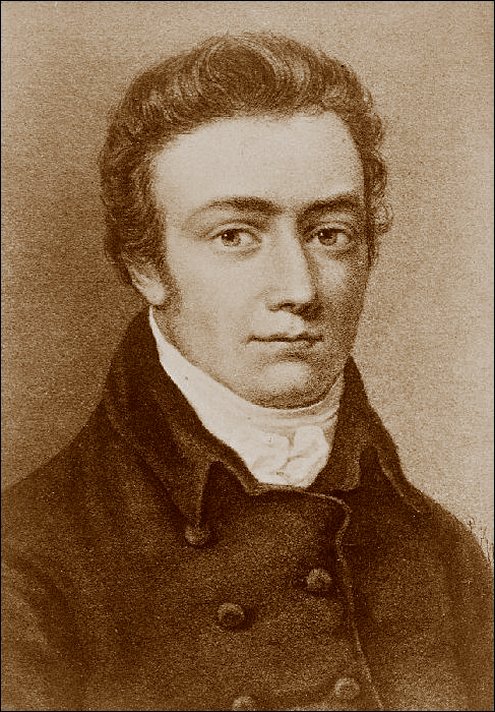
Samuel Taylor Coleridge
(1772-1834)
TO THE NIGHTINGALE
Sister of lovelorn poets, Philomel!
How many bards in city garret spent,
While at their window they with downward eye
Mark the faint lamp-beam on the kennell’d mud,
And listen to the drowsy cry of watchmen,
(Those hoarse, unfeather’d nightingales of time!)
How many wretched bards address thy name,
And hers, the full-orb’d queen, that shines above.
But I do hear thee, and the high bough mark,
Within whose mild moou-mellow’d foliage hid,
Thou warblest sad thy pity-pleading strains.
O I have listen’d, till my working soul,
Waked by those strains to thousand phantasies,
Absorb’d, hath ceas’d to listen! Therefore oft
I hymn thy name; and with a proud delight
Oft will I tell thee, minstrel of the moon,
Most musical, most melancholy bird!
That all thy soft diversities of tone,
Though sweeter far than the delicious airs
That vibrate from a white-arm’d lady’s harp,
What time the languishment of lonely love
Melts in her eye, and heaves her breast of snow,
Are not so sweet, as is the voice of her,
My Sara–best beloved of human kind!
When breathing the pure soul of tenderness,
She thrills me with the husband’s promised name!
SENTIMENTAL
The rose that blushes like the morn
Bedecks the valleys low;
And so dost thou, sweet infant corn,
My Angelina’s toe.
But on the rose there grows a thorn
That breeds disastrous woe;
And so dost thou, remorseless corn,
On Angelina’s toe.
THE EXCHANGE
We pledged our hearts, my love and I,–
I in my arms the maiden clasping;
I could not tell the reason why,
But, oh! I trembled like an aspen.
Her father’s love she bade me gain;
I went, and shook like any reed!
I strove to act the man–in vain!
We had exchanged our hearts indeed.
AN ODE TO THE RAIN
Composed Before Day-Light on the Morning Appointed for the Departure of a Very Worthy, But Not Very Pleasant Visitor, Whom It Was Feared The Rain Might Detain.
I know it is dark; and though I have lain
Awake, as I guess, an hour or twain,
I have not once open’d the lids of my eyes,
But I lie in the dark, as a blind man lies.
O Rain! that I lie listening to,
You’re but a doleful sound at best:
I owe you little thanks, ’tis true,
For breaking thus my needful rest!
Yet if, as soon as it is light,
O Rain! you will but take your flight,
I’ll neither rail, nor malice keep,
Though sick and sore for want of sleep.
But only now, for this one day,
Do go, dear Rain! do go away!
O Rain! with your dull two-fold sound,
The clash hard by, and the murmur all round!
You know, if you know aught, that we,
Both night and day, but ill agree:
For days, and months, and almost years,
Have limped on through this vale of tears,
Since body of mine, and rainy weather,
Have lived on easy terms together.
Yet if, as soon as it is light,
O Rain! you will but take your flight,
Though you should come again to-morrow,
And bring with you both pain and sorrow;
Though stomach should sicken, and knees should swell–
I’ll nothing speak of you but well.
But only now for this one day,
Do go, dear Rain! do go away!
Dear Rain! I ne’er refused to say
You’re a good creature in your way.
Nay, I could write a book myself,
Would fit a parson’s lower shelf,
Showing, how very good you are.–
What then? sometimes it must be fair!
And if sometimes, why not to-day?
Do go, dear Rain! do go away!
Dear Rain! if I’ve been cold and shy,
Take no offence! I’ll tell you why.
A dear old Friend e’en now is here,
And with him came my sister dear;
After long absence now first met,
Long months by pain and grief beset–
With three dear friends! in truth, we groan
Impatiently to be alone.
We three, you mark! and not one more!
The strong wish makes my spirit sore.
We have so much to talk about,
So many sad things to let out;
So many tears in our eye-corners,
Sitting like little Jacky Horners–
In short, as soon as it is day,
Do go, dear Rain! do go away.
And this I’ll swear to you, dear Rain!
Whenever you shall come again,
Be you as dull as e’er you could;
(And by the bye ’tis understood,
You’re not so pleasant, as you’re good;)
Yet, knowing well your worth and place,
I’ll welcome you with cheerful face;
And though you stay’d a week or more,
Were ten times duller than before;
Yet with kind heart, and right good will,
I’ll sit and listen to you still;
Nor should you go away, dear Rain!
Uninvited to remain.
But only now, for this one day,
Do go, dear Rain! do go away.
Samuel Taylor Coleridge: 4 Poems
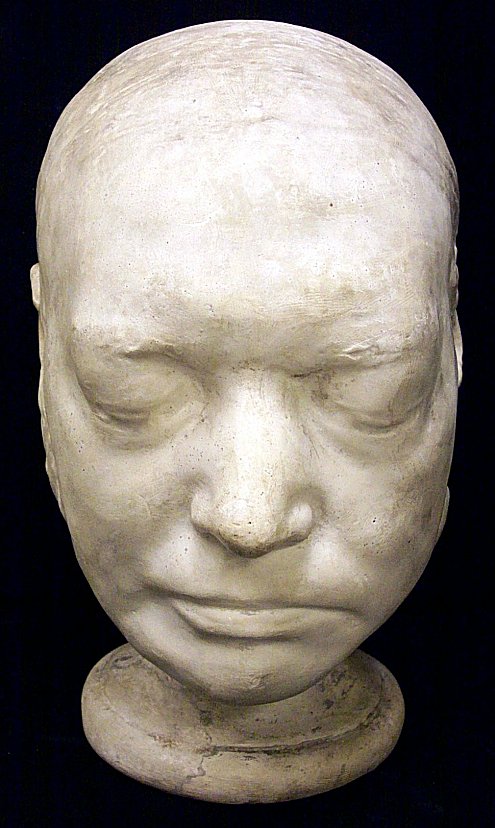
kemp=mag – kempis poetry magazine
More in: Coleridge, Samuel Taylor
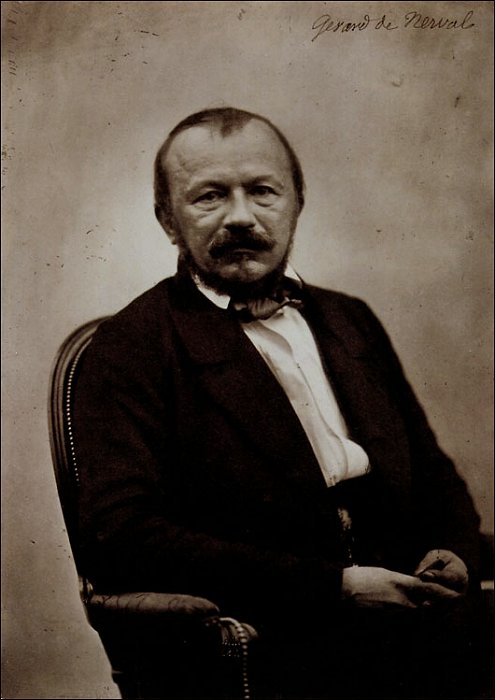
G é r a r d d e N e r v a l
(1808-1855)
Les Papillons
I
De toutes les belles choses
Qui nous manquent en hiver,
Qu’aimez-vous mieux ? – Moi, les roses ;
– Moi, l’aspect d’un beau pré vert ;
– Moi, la moisson blondissante,
Chevelure des sillons ;
– Moi, le rossignol qui chante ;
– Et moi, les beaux papillons !
Le papillon, fleur sans tige,
Qui voltige,
Que l’on cueille en un réseau ;
Dans la nature infinie,
Harmonie
Entre la plante et l’oiseau !…
Quand revient l’été superbe,
Je m’en vais au bois tout seul :
Je m’étends dans la grande herbe,
Perdu dans ce vert linceul.
Sur ma tête renversée,
Là, chacun d’eux à son tour,
Passe comme une pensée
De poésie ou d’amour !
Voici le papillon “faune”,
Noir et jaune ;
Voici le “mars” azuré,
Agitant des étincelles
Sur ses ailes
D’un velours riche et moiré.
Voici le “vulcain” rapide,
Qui vole comme un oiseau :
Son aile noire et splendide
Porte un grand ruban ponceau.
Dieux ! le “soufré”, dans l’espace,
Comme un éclair a relui…
Mais le joyeux “nacré” passe,
Et je ne vois plus que lui !
II
Comme un éventail de soie,
Il déploie
Son manteau semé d’argent ;
Et sa robe bigarrée
Est dorée
D’un or verdâtre et changeant.
Voici le “machaon-zèbre”,
De fauve et de noir rayé ;
Le “deuil”, en habit funèbre,
Et le “miroir” bleu strié ;
Voici l'”argus”, feuille-morte,
Le “morio”, le “grand-bleu”,
Et le “paon-de-jour” qui porte
Sur chaque aile un oeil de feu !
Mais le soir brunit nos plaines ;
Les “phalènes”
Prennent leur essor bruyant,
Et les “sphinx” aux couleurs sombres,
Dans les ombres
Voltigent en tournoyant.
C’est le “grand-paon” à l’oeil rose
Dessiné sur un fond gris,
Qui ne vole qu’à nuit close,
Comme les chauves-souris ;
Le “bombice” du troëne,
Rayé de jaune et de vent,
Et le “papillon du chêne”
Qui ne meurt pas en hiver !…
Voici le “sphinx” à la tête
De squelette,
Peinte en blanc sur un fond noir,
Que le villageois redoute,
Sur sa route,
De voir voltiger le soir.
Je hais aussi les “phalènes”,
Sombres hôtes de la nuit,
Qui voltigent dans nos plaines
De sept heures à minuit ;
Mais vous, papillons que j’aime,
Légers papillons de jour,
Tout en vous est un emblème
De poésie et d’amour !
III
Malheur, papillons que j’aime,
Doux emblème,
A vous pour votre beauté !…
Un doigt, de votre corsage,
Au passage,
Froisse, hélas ! le velouté !…
Une toute jeune fille
Au coeur tendre, au doux souris,
Perçant vos coeurs d’une aiguille,
Vous contemple, l’oeil surpris :
Et vos pattes sont coupées
Par l’ongle blanc qui les mord,
Et vos antennes crispées
Dans les douleurs de la mort !…
Gérard de Nerval: Les Papillons
fleursdumal.nl magazine
More in: Archive M-N, Nerval, Gérard de, Nerval, Gérard de
.jpg)
Der Ausflug ins Gebirge
Franz Kafka (1883-1924)
»Ich weiß nicht«, rief ich ohne Klang, »ich weiß ja nicht. Wenn niemand kommt, dann kommt eben niemand. Ich habe niemandem etwas Böses getan, niemand hat mir etwas Böses getan, niemand aber will mir helfen. Lauter niemand. Aber so ist es doch nicht. Nur daß mir niemand hilft –, sonst wäre lauter niemand hübsch. Ich würde ganz gern — warum denn nicht — einen Ausflug mit einer Gesellschaft von lauter Niemand machen.
Natürlich ins Gebirge, wohin denn sonst? Wie sich diese Niemand aneinander drängen, diese vielen quer gestreckten und eingehängten Arme, diese vielen Füße, durch winzige Schritte getrennt! Versteht sich, daß alle in Frack sind. Wir gehen so lala, der Wind fährt durch die Lücken, die wir und unsere Gliedmaßen offen lassen. Die Hälse werden im Gebirge frei! Es ist ein Wunder, daß wir nicht singen.«
.jpg)
Franz Kafka: Betrachtung 1913 – Für M.B.
fleursdumal.nl magazine
More in: Franz Kafka, Kafka, Franz, Kafka, Franz

Rainer Maria Rilke
(1875-1926)
Toten-Tanz
Sie brauchen kein Tanz-Orchester;
sie hören in sich ein Geheule
als waren sie Eulennester.
Ihr Ängsten näßt wie eine Beule,
und der Vorgeruch ihrer Fäule
ist noch ihr bester Geruch.
Sie fassen den Tänzer fester,
den rippenbetreßten Tänzer,
den Galan, den achten Ergänzer
zu einem ganzen Paar.
Und er lockert der Ordensschwester
über dem Haar das Tuch;
sie tanzen ja unter Gleichen.
Und er zieht der wachslichtbleichen
leise die Lesezeichen
aus ihrem Stunden-Buch.
![]()
Rainer Maria Rilke: Toten-Tanz
fleursdumal.nl magazine
More in: Archive Q-R, Rilke, Rainer Maria
.jpg)
Charles Baudelaire
(1821-1867)
L e s C h a t s
3 Poèmes
Le chat
Viens, mon beau chat, sur mon coeur amoureux:
Retiens les griffes de ta patte,
Et laisse-moi plonger dans tes beaux yeux,
Mêlés de métal et d’agate.
Lorsque mes doigts caressent à loisir
Ta tête et ton dos élastique,
Et que ma main s’enivre du plaisir
De palper ton corps électrique,
Je vois ma femme en esprit; son regard,
Comme le tien, aimable bête,
Profond et froid, coupe et fend comme un dard.
Et, des pieds jusques à la tête,
Un air subtil, un dangereux parfum
Nagent autour de son corps brun.
Le chat
I
Dans ma cervelle se promène
Ainsi qu’en son appartement,
Un beau chat, fort, doux et charmant,
Quand il miaule, on l’entend à peine,
Tant son timbre est tendre et discret;
Mais que sa voix s’apaise ou gronde,
Elle est toujours riche et profonde.
C’est là son charme et son secret.
Cette voix, qui perle et qui filtre
Dans mon fond le plus ténébreux,
Me remplit comme un vers nombreux
Et me réjouit comme un philtre.
Elle endort les plus cruels maux
Et contient toutes les extases;
Pour dire les plus longues phrases,
Elle n’a pas besoin de mots.
Non, il n’est pas d’archet qui morde
Sur mon coeur, parfait instrument,
Et fasse plus royalement
Chanter sa plus vibrante corde
Que ta voix, chat mystérieux,
Chat séraphique, chat étrange,
En qui tout est, comme un ange,
Aussi subtil qu’harmonieux.
II
De sa fourrure blonde et brune
Sort un parfum si doux, qu’un soir
J’en fus embaumé, pour l’avoir
Caressée une fois, rien qu’une.
C’est l’esprit familier du lieu;
Il juge, il préside, il inspire
Toutes choses dans son empire;
Peut-être est-il fée, est-il dieu?
Quand mes yeux, vers ce chat que j’aime
Tirés comme par un aimant,
Se retournent docilement,
Et que je regarde en moi-même,
Je vois avec étonnement
Le feu de ses prunelles pâles,
Clairs fanaux, vivantes opales,
Qui me contemplent fixement.
Les chats
Les amoureux fervents et les savants austères
Aiment également dans leur mûre saison,
Les chats puissants et doux, orgueil de la maison,
Qui comme eux sont frileux et comme eux sédentaires.
Amis de la science et de la volupté,
Ils cherchent le silence et l’horreur des ténèbres;
L’Erèbe les eût pris pour ses coursiers funèbres,
S’ils pouvaient au servage incliner leur fierté.
Ils prennent en songeant les nobles attitudes
Des grands sphinx allongés au fond des solitudes,
Qui semblent s’endormir dans un rêve sans fin;
Leurs reins féconds sont pleins d’étincelles magiques,
Et des parcelles d’or, ainsi qu’un sable fin,
Etoilent vaguement leurs prunelles mystiques.
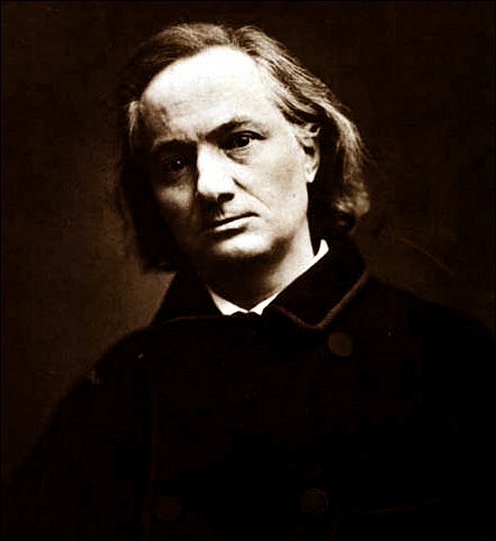
fleursdumal.nl magazine – magazine for art & literature
More in: Baudelaire, Charles
.jpg)
W i l l e m K l o o s
(1859-1938)
O Dood-zijn, liggend in een kist
O Dood-zijn, liggend in een kist, verterend
Langzaampjes aan, o eeuwig-eenzaam stom
Klein stil gelaat, op ‘t witte kussen, kerend,
Schoon ‘t Liefste u smeken zoude, u nooit meer om.
O, Mensdom, dat niet wil blijven stil lerend
Van Uw-Zelfs innerlijkste Zelf, o dom,
O, dom ja, daar ge u-zelf vernerend, krom,
Moest buigen voor ‘t groot Zijn, dit Al beherend.
‘n Mens-leven is een heel traag sterven gaande
Naar ‘t groot geheim, waarvoor elk wezen beeft,
De dood, een grijns, die goedig steeds blijft slaande,
Omdat de dood weet dat een ziel niet beeft
Voor ‘t hoog-klaar triomfantelijkst Aanstaande,
Daar al wat leeft waarachtig eeuwig leeft.
Graf-Paleisje
Ik maak van al de mensjes, die ik liefde,
Beeldjes, die ‘k ópzet in mijn hersenkas, –
Bleek en beweegloos, als gebootst uit was,
Staan ze, – stil doden-huisje van mijn Liefde;
En slag op slag, die dit mijn hart doorkliefde
Is daar gegriffeld, aan de wand, in kras
Bij kras van letters, die geen sterfling las
Dan ik, – vreemd doden-boekje van mijn Liefde:
Maar, midden in, prijkt hoog mijn Hart geheven,
Glorie van doods-kou, met de haat en ‘t lieven
Van ál dode uren, als een urn vol sintelen;
En buiten-op staat in de poort gedreven:
Laat nooit uw oog in andrer oog weertintelen,
Want twee mensen-ogen liegen als twee dieven.
Ik zal mooi dood-gaan
Ik zal mooi dood-gaan, als een vlammend vuur,
Dat ééns nog flikkerde in zijn schoonste gloed,
Eer ‘t gans geblust was. Want als enig goed,
Rest mij de schoonheid nog, een korte duur.
Hoe zalig is dat nu, wanneer ik tuur
Naar mijn gedachten in hun brede stoet,
Die álle schoon zijn, en niet één die doet,
Of zij wou vlieden uit Mijn hoog Bestuur.
Wat is dat goed, de grote rust van God,
De heerlijkheid eens kunst’naars, en ‘t geluk
Van mens, verenigd in één ogenblik!
Ik ben nu verder koud voor mijn aards lot:
Der aarde vreugden sterven, maar ik druk
Mij-zelf aan mijne borst, en lach noch snik.
![]()
Willem Kloos: 3 gedichten
kempis poetry magazine
More in: Kloos, Willem
.jpg)

Monica Richter: Gesicht im Wald -6
kempis poetry magazine
More in: Monica Richter, Richter, Monica
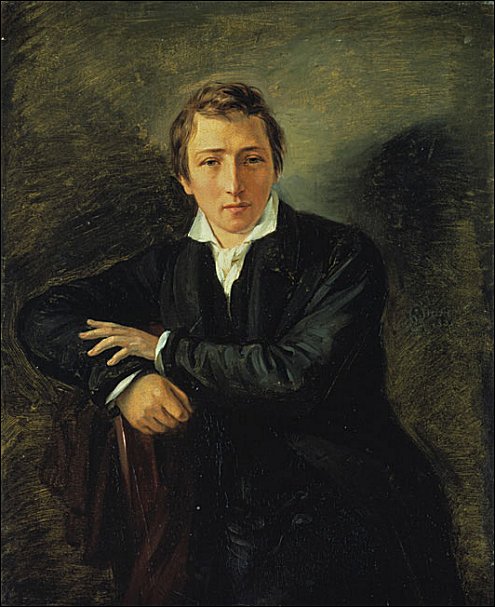
H e i n r i c h H e i n e
(1797-1856)
Gespraech auf der Paderborner Heide
Hoerst du nicht die fernen Toene,
Wie von Brummbass und von Geigen?
Dorten tanzt wohl manche Schoene
Den gefluegelt leichten Reigen.
"Ei, mein Freund, das nenn ich irren,
Von den Geigen hoer ich keine,
Nur die Ferklein hoer ich quirren,
Grunzen nur hoer ich die Schweine."
Hoerst du nicht das Waldhorn blasen?
Jaeger sich des Weidwerks freuen;
Fromme Laemmer seh ich grasen,
Schaefer spielen auf Schalmeien.
"Ei, mein Freund, was du vernommen,
Ist kein Waldhorn, noch Schalmeie;
Nur den Sauhirt seh ich kommen,
Heimwarts treibt er seine Saeue."
Hoerst du nicht das ferne Singen,
Wie von suessen Wettgesaengen?
Englein schlagen mit den Schwingen
Lauten Beifall solchen Klaengen.
"Ei, was dort so huebsch geklungen,
Ist kein Wettgesang, mein Lieber!
Singend treiben Gaensejungen
Ihre Gaenselein vorueber."
Hoerst du nicht die Glocken laeuten,
Wunderlieblich, wunderhelle?
Fromme Kirchengaenger schreiten
Andachtsvoll zur Dorfkapelle.
"Ei, mein Freund, das sind die Schellen
Von den Ochsen, von den Kuehen,
Die nach ihren dunkeln Staellen
Mit gesenktem Kopfe ziehen."
Siehst du nicht den Schleier wehen?
Siehst du nicht das leise Nicken?
Dort seh ich die Liebste stehen,
Feuchte Wehmut in den Blicken.
"Ei, mein Freund, dort seh ich nicken
Nur das Waldweib, nur die Lise;
Blass und hager an den Kruecken
Hinkt sie weiter nach der Wiese."
Nun, mein Freund, so magst du lachen
UEber des Phantasten Frage!
Wirst du auch zur Taeuschung machen,
Was ich fest im Busen trage?
.jpg)
Heinrich Heine poetry
kempis poetry magazine
.jpg)
More in: Heine, Heinrich

.jpg)
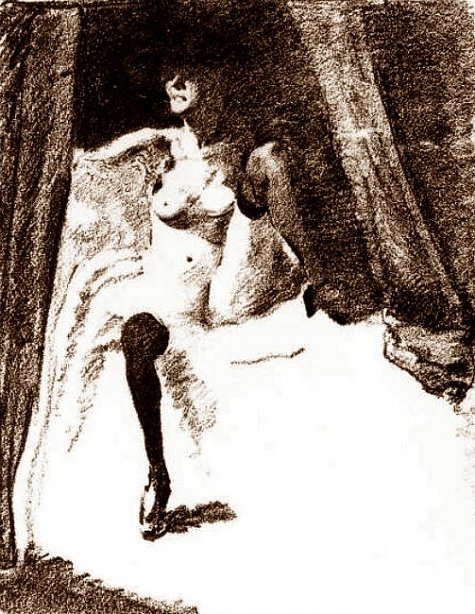

.jpg)
.jpg)
Galerie Anita Berber – 8
Anita Berber (June 10, 1899 – November 10, 1928) was a German dancer, actress and writer. Anita Berber was painted by many artist, among them Otto Dix.
Her lover was dancer Sebastian Droste. In 1922, Berber and Droste published a book of poems, photographs, drawings: Kokain. Berber’s cocaine addiction and bisexuality were matters of public chatter. She was allegedly the sexual slave of a woman and the woman’s 15-year-old daughter. She could often be seen in Berlin’s hotel lobbies, nightclubs and casinos, naked apart from a sable wrap and a silver brooch filled with cocaine. Besides being a cocaine addict, she was an alcoholic.
Anita Berber died of tubercolosis, at the age of 29, on November 10, 1928 in a Kreuzberg hospital and was buried at St. Thomas cemetery in Neukölln.
In 1987 film Rosa von Praunheim made a film titled: Anita – Tänze des Lasters.
fleursdumal.nl magazine – magazine for art & literature
More in: Anita Berber, Anita Berber, Berber, Berber, Anita, DANCE & PERFORMANCE
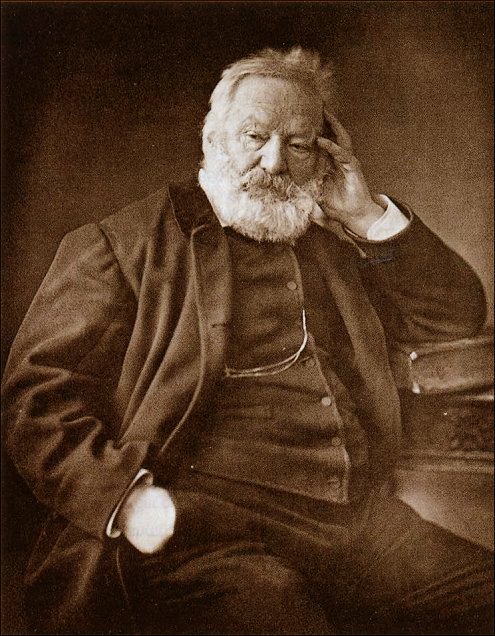
V i c t o r H u g o
(1802-1885)
Au peuple
Il te ressemble ; il est terrible et pacifique.
Il est sous l’infini le niveau magnifique ;
Il a le mouvement, il a l’immensité.
Apaisé d’un rayon et d’un souffle agité,
Tantôt c’est l’harmonie et tantôt le cri rauque.
Les monstres sont à l’aise en sa profondeur glauque ;
La trombe y germe ; il a des gouffres inconnus
D’où ceux qui l’ont bravé ne sont pas revenus ;
Sur son énormité le colosse chavire ;
Comme toi le despote il brise le navire ;
Le fanal est sur lui comme l’esprit sur toi ;
Il foudroie, il caresse, et Dieu seul sait pourquoi ;
Sa vague, où l’on entend comme des chocs d’armures,
Emplit la sombre nuit de monstrueux murmures,
Et l’on sent que ce flot, comme toi, gouffre humain,
Ayant rugi ce soir, dévorera demain.
Son onde est une lame aussi bien que le glaive ;
Il chante un hymne immense à Vénus qui se lève ;
Sa rondeur formidable, azur universel,
Accepte en son miroir tous les astres du ciel ;
Il a la force rude et la grâce superbe ;
Il déracine un roc, il épargne un brin d’herbe ;
Il jette comme toi l’écume aux fiers sommets,
Ô peuple ; seulement, lui, ne trompe jamais
Quand, l’oeil fixe, et debout sur sa grève sacrée,
Et pensif, on attend l’heure de sa marée.
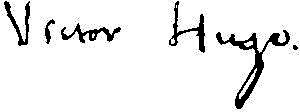
Victor Hugo poetry
fleursdumal.nl magazine
More in: Archive G-H, Archive G-H, Hugo, Victor, Victor Hugo
Thank you for reading Fleurs du Mal - magazine for art & literature